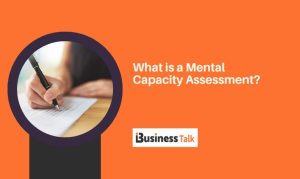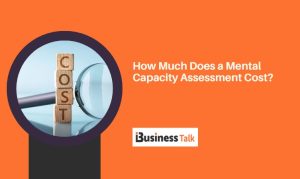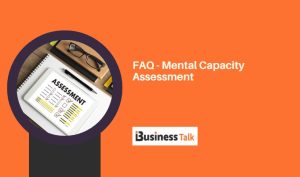
Mental Capacity Assessment – A Complete Guide
Mental capacity assessment is a test that determines if the person of interest has the mental capacity to understand the particular decision-making process and act accordingly. For example, this decision-making process could be a power of attorney, advance medical directive, guardianship, or any other document in which mental capacity is relevant.
In this blog, we’ll talk about mental capacity assessment and how it should be carried out. We’ll also share some of the best mental capacity assessment tools you can use to determine an individual’s mental capacity level.
What is a Mental Capacity Assessment?

- Medical professionals use a mental capacity assessment to determine an individual’s mental capacity to make particular decisions, such as care preferences and who will manage their money.
- Mental capacity assessments are designed to protect and empower people aged 16 and over who may lack the mental capacity to make decisions about their care and treatment.
- The two-stage test of mental capacity assessments is used to decide whether an individual can make a particular decision. This includes a functional test and a diagnostic test.
- The functional test assesses an individual’s ability to understand, remember, communicate, and reason, while the diagnostic test determines an individual’s mental capacity level.
- Typically, individuals are entitled to make decisions that health professionals consider unwise if they can do so. However, it is important to note that individuals are also entitled to make decisions that are in line with their best interests if they can understand those decisions.
When is a Mental Capacity Assessment Required?
- According to the Mental Capacity Act 2005 (MCA), a mental capacity assessment is required when an individual cannot make a decision due to an impairment of, or disturbance in, their mind or brain functioning.
- This includes individuals who are unable to make a decision because of mental illness, dementia, learning disability, or other temporary states such as confusion or unconsciousness.
- In a mental capacity assessment, a healthcare professional will conduct a series of tests to assess the individual’s mental capacity. This may include asking them specific questions and assessing their ability to follow instructions and communicate clearly.
- A mental capacity assessment can be simple or complex and may take 30 minutes and an hour to complete. Therefore, an experienced health professional, such as a social worker or medical doctor, should do so.
- A mental capacity assessment is important because it provides healthcare professionals with information about individuals’ decision-making and participation in their care. It also helps identify underlying conditions that may require additional care and support.
A mental capacity assessment ensures individuals receive care and support that best suits their needs.
Who Can Carry Out a Mental Capacity Assessment?

Under the Mental Capacity Act 2005 (MCA), anyone caring for or supporting a person lacking capacity can be involved in assessing capacity. This includes family members, medical professionals, carers, and other relevant parties. However, it is vital that the carer or supporter is aware of the assessment steps and can provide accurate and detailed information to the person’s assessor.
A mental capacity assessment should be conducted in a safe and non-confrontational environment. It is best practice to involve the person being assessed in the decision-making process as much as possible when conducting a mental capacity assessment. Good professional training is key for carrying out a mental capacity assessment effectively and professionally.
In cases involving complex or major decisions, a professional opinion from a general practitioner (GP) or a specialist (consultant psychiatrist or psychologist) may be necessary. The two-stage capacity test includes questions about the person’s behaviour to look for impairment or disturbance of the functioning of the mind or brain.
2 Stages of Mental Capacity Assessment
Mental capacity assessments involve two stages, the functional test and the diagnostic test.
- The functional test determines whether an individual cannot make a particular decision. For example, it might involve asking the individual to answer a specific question independently, without any external influence. A particular impairment may be identified through this assessment stage, for example, dementia or mental illness.
- The second stage is the diagnostic test. This assesses any impairments or disturbances in the functioning of the mind or brain. This includes examining illnesses, injuries, external factors such as substance use, or other cognitive issues. Again, the starting assumption should always be that people can decide for themselves, and no coercion should be used.
This assessment is essential in providing individuals with appropriate care and assistance when they cannot act for themselves due to mental illness or disability.
How Much Does a Mental Capacity Assessment Cost?

A mental capacity assessment is meeting the needs of a person with a mental impairment through mental health assessment tools. This process typically involves using a test to assess mental capacity and is designed to empower those in care to make informed decisions about their care.
The cost of a mental capacity assessment varies depending on the assessment type and the professional conducting it. Assessments are typically conducted by a general practitioner (GP) or specialist (consultant psychiatrist or psychologist). Professional training is key in assessing capacity; however, a professional opinion may be necessary for complex or major decisions.
The two-stage test for assessing mental capacity empowers those in care to assess capacity themselves. It includes a functional and diagnostic test that assesses the person’s ability to make informed decisions for themselves.
The cost of a mental capacity assessment varies depending on factors such as the person’s age, gender, and cultural background. In addition, a professional opinion can help make informed care decisions and supports someone with mental impairment.
Mental Capacity Assessment Example Questions
- How well can the person understand complex information?
- Can the person manage their finance department issues?
- Does the person have the capacity to make decisions about their health care, including whether or not to receive treatment?
- What aspects of day-to-day life does the person find difficult (e.g., communicating with family/friends, getting around independently)?
- Can the person make reasonable decisions about major life choices, like marrying or having children?
- What are the person’s current mental and physical health conditions?
- How well can the person care for themselves (e.g., bathing, dressing)?
- Could any factors increase or decrease capacity (e.g., age, illness)? 9. Has the person been able to participate in court proceedings or make decisions about their care?
- What are some of the person’s strengths and weaknesses (e.g., doing well under pressure, being detail-oriented)?
What Does Curb Assessment Stand for in Mental Capacity?
- Curb Assessment is a mental capacity assessment used to evaluate a person’s decision-making capacity. It refers to the ability of an individual to understand and appreciate the consequences of treatment, as well as the ability to make informed decisions.
- The two-stage test is used in capacity assessment; this includes a ‘functional test’ and a ‘diagnostic test’.
- The ‘functional test’ assesses an individual’s mental abilities on a particular task or category, such as reasoning, decision-making, or problem-solving. It can be done with paper-and-pencil or computerized tests, depending on the person’s needs.
- The ‘diagnostic test’ evaluates specific mental abilities, such as memory or attention. As mentioned above, it may be done with paper-and-pencil or computerized tests, depending on the person’s needs.
Elderly individuals are those 60 years of age or older, according to the Texas Human Resources Code. Developmental disabilities are those deficits in mental functioning that result from impaired mental capacity due to illness, developmental delay, or other factors.
Power of Attorney Mental Capacity Assessment

The donor’s mental capacity to judge whether the proposed attorney of health and welfare is trustworthy, competent, and reliable will be examined in a Lasting Power of Attorney mental capacity test.
A mental capacity assessment is a process by mental health professionals to determine an individual’s mental capacity. The process aims to determine if the person cannot make or understand decisions or if they can make them but is unable, for example, due to age and physical disability.
A power of attorney may be granted to someone to make decisions on behalf of someone who cannot decide for themself. In this case, it would be essential that both parties consent fully and understand the implications of their decision.
Conclusion
Mental capacity assessment is a person-centred process to understand the person’s mental functioning and ability to act in an individual capacity. It is essential to understand that mental capacity assessment should not be viewed as an end-all solution for mental health care but as a tool to help guide treatment decisions and support decision-making.
Therefore, a mental capacity assessment is best used alongside other assessment methods, such as interviews and documents, to provide a comprehensive picture of the person’s mental capacity.
FAQ – Mental Capacity Assessment

How do you assess mental capacity?
There is a two-stage mental capacity test to assess mental capacity, as outlined by the Mental Capacity Act 2005 (MCA).
The first stage of the test is to determine if a person has an impairment of their mind or brain due to a long-term condition or external factors such as alcohol or drug use. This first stage of the assessment should be started from the assumption that the individual has capacity.
If the person has an impairment, the second stage of the test will determine if the impairment or disturbance prevents the person from making the specific decision. Mental capacity is not determined by age or appearance, and the starting point of the assessment should be that the individual has capacity.
What are the 5 principles of assessing mental capacity?
When assessing mental capacity, the following five principles should be followed:
- The individual is able to make their own decisions.
- Necessary reasonable adjustments should enable the person to make their own decisions.
- Do not assume the inability to decide based on an unwise decision or disagreement.
- If unable to decide, another person must decide in the individual’s best interest.
- A least restrictive course of action that doesn’t confine the individual or violate their rights should be taken.
What are the 4 capacity questions?
The four capacity questions are:
- Can the person understand information about the decision?
- Can the person retain the information long enough to decide?
- Can the person use or ‘weigh up’ the information in decision-making?
- Can the person communicate their decision through any means?
How do you perform a capacity evaluation?
A capacity evaluation involves assessing the ability of a person to understand relevant information and consider the foreseeable consequences of their decisions. This process usually starts with the functional test, determining whether the patient can make a particular decision.
If the patient cannot make that decision, it may be due to an impairment of their mind or brain. The diagnostic test then helps to determine the cause of the impairment.
What are the two most common measures of capacity?
The two-stage test is the most common measure of capacity. This consists of two questions:
Stage 1 – Can the person make a particular decision (the functional test)?
Stage 2 – Is the inability to make a decision caused by an impairment of, or disturbance in the functioning of, a person’s mind or brain?
A Capacity Assessment is another common measure of capacity. This involves assessing two branches:
- The patient’s ability to understand the information relevant to deciding on the treatment
- The patient’s ability to appreciate the reasonably foreseeable consequences of a decision or lack of a decision.
What tool is used to assess mental capacity?
No one tool can be used to assess mental capacity. Instead, different tools are usually specific to particular assessment tasks. For example, the functional test may determine a person’s ability to make a decision. In contrast, the clinician would use the diagnostic test to diagnose an impairment of brain function.
What is the MCA best interest checklist?
The MCA best interest checklist is a document that is outlined in the Code of Practice for the Mental Capacity Act. It is designed to help decision-makers make informed decisions about a person’s care and treatment.
Some of the specific considerations in the checklist include whether the person will regain capacity, consulting relevant people, considering all information, and avoiding assumptions.
Remembering that the decision-maker should always select the least restrictive option is important. In addition, records of the assessment process, the decision, and who was consulted should be kept so everyone involved can record what happened during the process.
What are the six assessment criteria?
The six assessment criteria are as follows:
- Understanding: The individual must understand the information being given and use that information to make a decision.
- Retaining: The individual must remember and use the information in future decision-making.
- Weighing up: The individual must be able to decide based on the information, considering all the relevant factors.
- Communicating information: The individual must be able to communicate the information they have learned effectively to others.
- Decision-making: This capacity may fluctuate over time and is specific to the treatment offered.
- Capacity assessments: This should be done by health and social care professionals. However, complex decisions may require a professional opinion from a GP, consultant psychiatrist, or psychologist.





